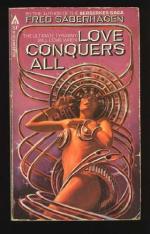When it comes time to pack up for home, you shake the sand from among the leaves and save out the book to be read on the train. And you leave it in the automobile that takes you to the station.
But for all that, “take along a book.” It might rain all summer.
XXXVII
CONFESSIONS OF A CHESS CHAMPION
With the opening of the baseball season, the sporting urge stirs in one’s blood and we turn to such books as “My Chess Career,” by J.R. Capablanca. Mr. Capablanca, I gather from his text, plays chess very well. Wherein he unquestionably has something on me.
His book is a combination of autobiography and pictorial examples of difficult games he has participated in and won. I could understand the autobiographical part perfectly, but although I have seen chess diagrams in the evening papers for years, I never have been able to become nervous over one. It has always seemed to me that when you have seen one diagram of a chessboard you have seen them all. Therefore, I can give only a superficial review of the technical parts of Mr. Capablanca’s book.
* * * * *
His personal reminiscences, however, are full of poignant episodes. For instance, let us take an incident which occurred in his early boyhood when he found out what sort of man his father really was—a sombre event in the life of any boy, much more so for the boy Capablanca.
“I was born in Havana, the capital of the Island of Cuba,” he says, “the 19th of November, 1888. I was not yet five years old when by accident I came into my father’s private office and found him playing with another gentleman. I had never seen a game of chess before; the pieces interested me and I went the next day to see them play again. The third day, as I looked on, my father, a very poor beginner, moved a Knight from a white square to another white square. His opponent, apparently not a better player, did not notice it. My father won, and I proceeded to call him a cheat and to laugh.”
Imagine the feelings of a young boy entering his father’s private office and seeing a man whom he had been brought up to love and to revere moving a Knight from one white square to another. It is a wonder that the boy had the courage to grow up at all with a start in life like that.
But he did grow up, and at the age of eight, in spite of the advice of doctors, he was a frequent visitor at the Havana Chess Club. As he says in describing this period of his career, “Soon Don Celso Golmayo, the strongest player there, was unable to give me a rook.” So you can see how good he was. Don Celso couldn’t give him a rook. And if Don Celso couldn’t, who on earth could?
In his introduction, Mr. Capablanca (I wish that I could get it out of my head that Mr. Capablanca is possibly a relation of the Casablanca boy who did the right thing by the burning deck. They are, of course, two entirely different people)—in his introduction, Mr. Capablanca says:




